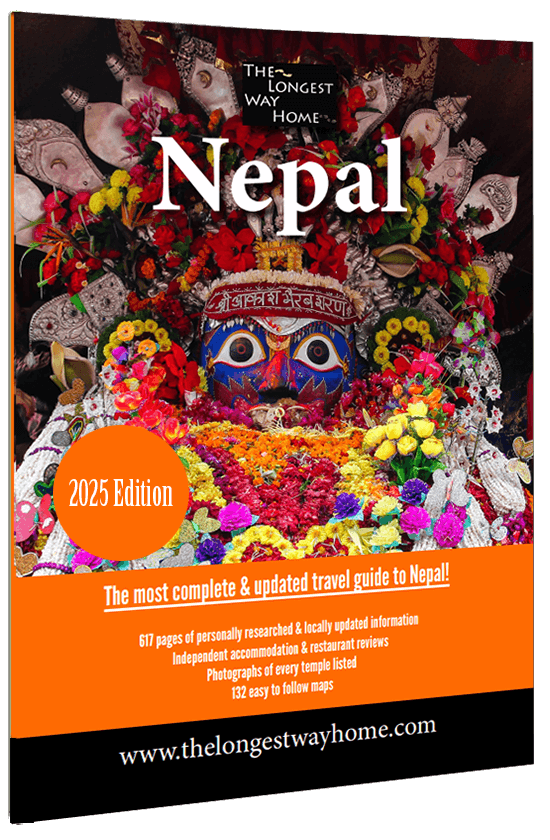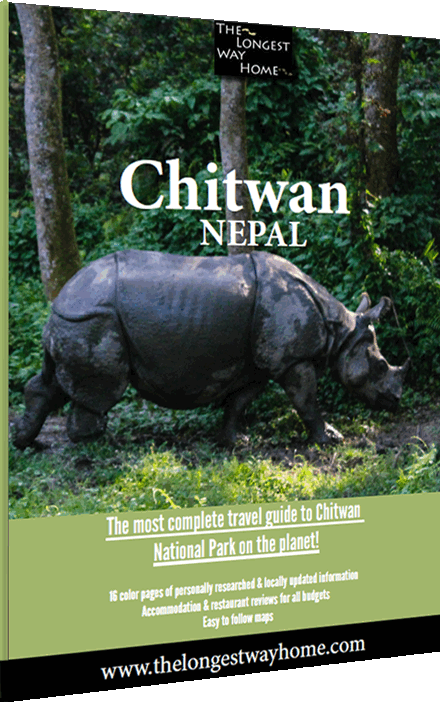About Elephant Safaris in Chitwan

There are only two types of Elephant safaris in Chitwan National Park. Both take place in separate areas on the Sauraha side of the park. One is government-run, the other is run privately.
Government elephant safaris were near the Chitwan national park ticket office; however, in 2018, it's better to inquire at the NTNC office nearby. While private elephant safaris are held on the other side of Sauraha. Do see the map of Chitwan national park to see where they are.
Did you know? The elephants in Chitwan National Park are Indian elephants. Some are still wild. Others are from the Sauraha Elephant Breeding Center and many are privately owned. The man that rides and looks after the elephant is known as a Mahout. Elephants have been for anti poaching purposes in Nepal for decades to reach parts of the jungle vehicles and people cannot reach. Nepal has one of the most successful anti poaching programs in the world. |
No matter which tour you decide you'll need to pay for a Chitwan National Park ticket.
Arranging an elephant safari in Chitwan
Generally speaking, a private elephant safari is more popular as it's easier to arrange and slightly cheaper. NTNC (government/public) currently do not do elephant safaris.
Government elephant safari
- Go to the NTNC office to see if they have an elephant available
- Choose a time to go out. Morning or late afternoon
- Go to the Chitwan National Park ticket office
- Purchase a ticket for the National Park and the elephant safari
- Return well before your scheduled elephant safari
- The safari is for 1 hour
Private elephant safari
- Arrange through a tour operator or your guesthouse
- If you don't have a National Park Ticket, be sure to have the agent or guesthouse purchase one for you
- There are usually 3-4 elephant safaris a day. Two in the morning and two in the afternoon
- There are four people to an elephant
- The tours are usually 1-1.5 hours
- You'll either be picked up by the elephant and Mahout, or driven to the park entrance.
Cost of elephant safaris in Chitwan
You need two tickets. A national park entrance ticket (valid for one day). And your elephant safari ticket (valid for one ride).
Chitwan National Park fee: 1800 rupees for a foreigner. 1000 rupees SAARC. 50 rupees Nepali.
Government elephant safari cost: It's 2500 rupees for a foreigner. 1000 rupees SAARC. 200 rupees Nepali.
Private elephant safari cost: Prices vary from 1850 rupees to 2,000+ rupees. Generally speaking, the more expensive your hotel or guesthouse, the more they will charge you. The safari is no different!
Total cost: National park entrance fee + either government safari ticket or private ticket.
Wildlife you are likely to see on an elephant safari
There are over 700 types of mammal in Chitwan National Park. Most of it will not be seen on an elephant safari. However, you do have a strong chance at seeing the following:
One-horned rhinos, forest deer, peacock, Indian cookoo, wild boar, sambar deer, red muntjac, Indian porcupines, and Rhesus monkeys.
How to ride an elephant
How to ride an elephant: To mount an elephant in Chitwan, you'll need to climb up onto an elephant docking station, either up a series of steps or ladder. You then walk onto the seat area and sit down by wrapping your legs around the corner pole of the seat. Four to a seat/elephant.
What to wear: Do wear long sleeved shirts and pants. Some of the jungle is dense and branches will brush up against you.
Tips for an elephant safari
Do keep quiet when riding the elephant to enjoy the jungle surroundings and not frighten the rhinos away!
Keep your possessions tied close to you. Dropping them means saying goodbye to them. You are not allowed off the elephant until you are outside the park.
The jungle can be quite dark. So be prepared for some low light photography!
The best time to see rhinos is early morning or late afternoon. But it depends on the season. Early morning also stands a chance of not knowing where the rhinos are. In late afternoon the mahouts know where they are but the rhinos might go back into the deeper jungle early. There is a game of chance.
If you are doing a jungle trek the next day, you can use your Chitwan National Park ticket on the day you buy it for an elephant safari that day. This saves you from having to buy another ticket!
Is riding an elephant ethical in Nepal?
It's important to keep an open mind no matter one's opinions when thinking about elephant riding in Chitwan. It's not always what it seems.
Rightfully, much has been made about elephant tourism in places like Thailand. However, Nepal is not Thailand, and elephants have a very different role to play in Nepal.
Royal Bengal Tigers and One-horned Rhinos are endangered species. Yet Nepal has the highest conservation record in the world for both species, whose population is also growing. Part of this is contributed to Elephant patrols searching for poachers. These patrols reach dense parts of the jungle jeeps and people cannot easily reach.
In recent years, many overseas NGOs have protested against elephant riding in Chitwan. Public support drums up visions of Thai or Indian elephant abuse and does not consider Nepal's situation. Is it ideal, no. Does it help other endangered species, yes.
Of note is the idea that Elephant walks are more ethical than riding an Elephant. Some of these walks are even promoted by large resorts as being better. However, what is not told is that these elephants are "broken in" the same way as patrol elephants and elephants bred for tourism. There's no difference - just better marketing.
Today in Chitwan, the harsh metal sticks and metal chains are a thing of the past. Yes, at the NTCC compound, the Male elephants come back from patrol and have a foot chained. The reason for this chain is that the bull elephants kept breaking the rope tethers as they went off to look for nearby female elephants.
Again, it's worth keeping all sides of the elephant story open when visiting Chitwan. For some people, there's no way they'd want to participate, and that's fine. For others, they feel that elephant tourism contributes to the protection of other endangered animals and that of the entire part. The choice at the end of the day is yours to make. In all cases, there's a lot to do in Chitwan other than riding an elephant!
Do read my article on ethical elephant tourism in Nepal for more.
Meanwhile, if you plan on visiting Chitwan, it's important to read this guide on buying Chitwan National Park tickets.
Download my guidebooks to Nepal
Liked this page? You'll love my books! They are hands on guidebooks that are better than the rest. Yes, really! In them I cover all attractions with step-by-step accuracy using well researched information, photographs and travel tested walking tours.
Available in print or digital editions - the best guidebooks for visiting Nepal.
 |
 |
Full Nepal Guidebook
|
Chitwan National Park Guidebook
|
Discover more guidebooks!
Was this page helpful to you? If so please tell others!


